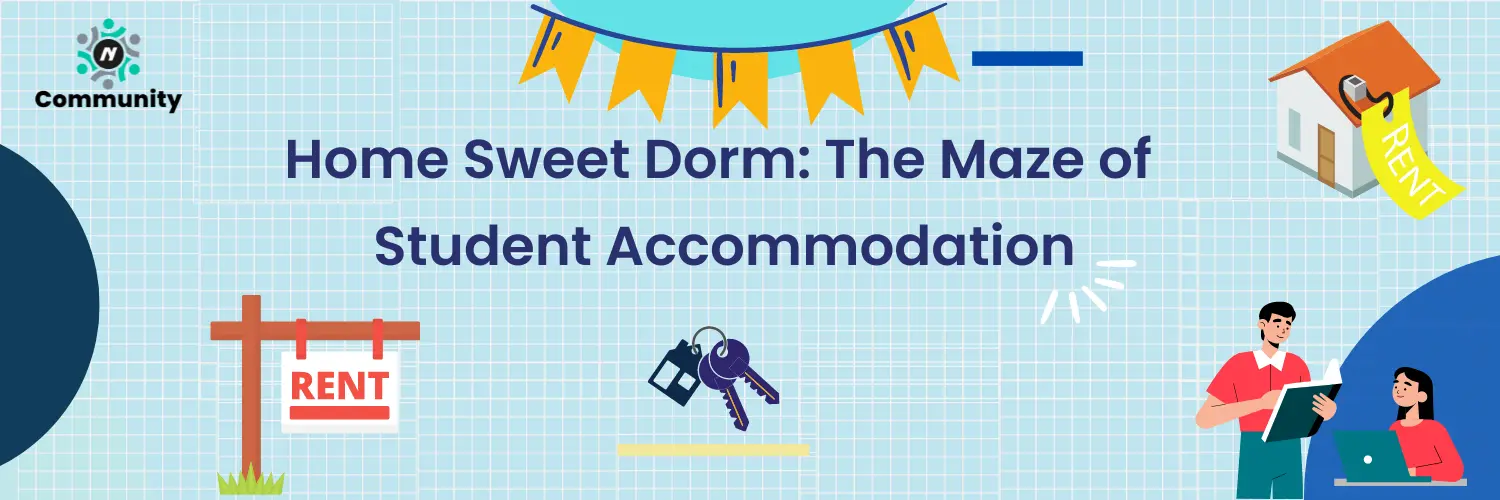
Exploring Types of Student Accommodation Abroad for Indians
Types of Student Accommodation Available While Travelling Abroad
share
[playht_player width=“100%” height=“90px” voice=“Noah”]
Dreaming of studying abroad but feeling overwhelmed by the logistics? Fear not, fellow explorer! One of the most crucial decisions you’ll make is choosing your student accommodation.
“Welcome to the real world! It sucks. You’re gonna love it!” – Friends Starting off on this note, finding the perfect student accommodation can be an exciting and challenging part of entering the real world of college life. Just like the iconic quote from Friends, the journey may have its ups and downs, but ultimately, you’ll discover the joys and adventures of independent living. So, gear up for an incredible experience as we guide you through the world of types of student accommodation in the US! Fret not, dear students, for we have crafted the ultimate guide to help you sail through the process with ease. From understanding different student off-campus housing and accommodation options to considering essential factors and exploring online resources, we’ve got you covered. So, let’s dive in and create your cozy home away from home!
Different types Of Student Accommodation:
When it comes to student accommodation, there are several options to consider. On-campus Student Accommodation, student apartments, homestays, and off-campus rentals each offer unique advantages and considerations. Always explore these options in detail, including their pros and cons, costs, amenities, and proximity to campus. Whether you crave the vibrant community of dorm life or the independence of student off-campus housing, most of all, understanding the available choices will help you make an informed decision. Let’s take a closer look at each one:
- On Campus Accommodation or Campus Apartments
- Student Off-Campus Housing or Apartments
- Private Dormitories
- Family stays or Homestays
- Student studios
- Student apartments
- Ensuite accommodation
On-Campus Accommodation or Campus Apartments
Living in on-campus apartments provides a convenient and immersive college experience. We’ll explore the benefits, room types, and tips for securing a dormitory spot.
Advantages of On-Campus Accommodation or Campus Apartments:
- Located close to classes, libraries, and other campus facilities, reducing commute time and increasing accessibility.
- Provides built-in community with fellow students, facilitating social interaction and fostering a sense of belonging.
- Campus Apartments offer more privacy and autonomy with individual apartments or shared units with fewer residents.
Disadvantages of On-Campus Accommodation or Campus Apartments:
- Shared living spaces and communal amenities can restrict personal space and quiet time.
- Campus Apartments are often more expensive than on-campus accommodation due to additional amenities and potential location off campus.
Off-Campus Housing Apartments
An off-campus student apartment is a rental unit located outside of the boundaries of a college or university campus. Unlike on-campus housing provided by the institution, students find and manage their apartments independently. These apartments can vary in size, style, and amenities, offering greater flexibility and customization than traditional dorm rooms.
Renting an apartment off-campus offers more independence and flexibility. And, if you plan to live in a homestay or shared accommodation with local students, grasp the opportunity to learn about their culture and share your own.
Advantages of Off-Campus Apartments:
- Increased Privacy and Independence: Off-campus apartments offer significantly more privacy and independence compared to traditional on-campus apartments. You have your own space, control over noise levels, and freedom to establish your own routines and guest policies.
- You can choose a location close to campus or explore different neighborhoods, and personalize your space with your own furniture and decor.
Disadvantage of Off-Campus Apartments:
Living off-campus comes with more responsibility, including managing bills, utilities, maintenance, and potentially finding roommates. Off-campus apartments can also be more expensive than on-campus housing, requiring careful budgeting and planning.
Private Dormitories
Private dormitories are a type of student accommodation where students have their own individual bedrooms and bathroom, instead of sharing with other students. This type of housing is becoming increasingly popular, as it offers several advantages over traditional shared dormitories.
Advantages of Private dormitories:
- Private dormitories provide students with a greater sense of privacy and security, as they do not have to share their living space with others.
- Private dormitories eliminate this problem, allowing students to create a study-friendly environment without worrying about noise or interruptions.
Disadvantage of Private dormitories:
- Private dormitories are typically more expensive than traditional shared dormitories. This is due to the additional cost of providing each student with their own bedroom and bathroom.
Homestays (Family Stays)
Living with a host family can offer a unique cultural experience and a supportive environment. We’ll delve into the benefits, considerations, and tips for finding a suitable homestay.
In fact, If you encounter any issues or have concerns about your accommodation, maintain open and respectful communication with your landlord or host family. Promptly address any maintenance or safety issues that arise.
P.S.: Reach out to your university’s housing office for guidance, assistance, and information on available on-campus and off-campus housing options. They are usually proactive in all such matters.
Advantages of Homestay or Family Stay:
- Students can learn about customs and traditions, try new foods, and develop their language skills through daily interactions with their host family
- They can help students navigate cultural differences, academic challenges, and everyday life in a new country. Having a supportive and welcoming family to turn to can ease the transition and make the experience more enjoyable.
Disadvantages of Homestay or Family Stay:
- Students may need to adjust to sharing common areas and adhering to the family’s rules and routines. This can be challenging for students who are used to having more independence.
Student Stays
Student stays typically consist of one room that serves as a living area, bedroom, and kitchen, along with a bathroom. And at times combined living area and kitchen with separate bedroom.
Advantages of Student Stays:
- Cheaper than private apartments but offers similar level of privacy and independence.
- Studios allow students to develop self-discipline and learn valuable life skills like budgeting, cooking, and cleaning.
Disadvantages of Student Stays:
- Studios can feel cramped and claustrophobic, especially for students accustomed to larger living areas.
Student Apartments:
Student apartments are rental units specifically designed and marketed towards students. These apartments often offer amenities and features tailored to student needs, such as furniture rentals, flexible leases, proximity to campus, and security features.
Advantage of Student Apartments:
- Some student apartments offer furniture rentals, laundry facilities, cleaning services, and high-speed internet, simplifying living arrangements.
Disadvantage of Student Apartments:
- Student apartments can be more expensive than other student housing options like shared rooms or dormitories.
Ensuite accommodation
Ensuite accommodation refers to a room, typically within a student housing complex, that has its own private bathroom. This bathroom is directly accessible from the room, providing residents with increased privacy and convenience compared to shared bathroom facilities.
Advantage of Ensuite Accommodation:
- More cheaper than even student stays.
- Private bathroom
Disadvantage of Ensuite Accommodation:
- Extremely short room size.
Factors to Consider For Student Accommodation: Location, Budget, and Amenities 💰🌍
Begin your accommodation search well in advance to have ample time for research, decision-making, and securing a spot. As you embark on your quest for the perfect student accommodation, keep in mind that there are a few essential factors to consider. Location plays a crucial role in your daily life, choosing a neighborhood that suits your preferences and offers convenient access to campus and amenities. Some of these conveniences and facilities enhance your living experience, from study spaces and fitness centers to laundry facilities and communal areas.
A laundry list to absorb all your requirements for making informed decisions would include:
- Budgeting: Create a realistic budget that takes into account not only rent but also utilities, transportation, groceries, and other living expenses.
- Location: Assess the proximity of the accommodation to your university, public transportation, grocery stores, and other amenities important to you.
- Roommate Compatibility: If you’re considering shared accommodation, discuss expectations, lifestyle habits, and study preferences with potential roommates to ensure compatibility.
- Lease Agreements: Carefully review the lease agreement, paying attention to terms, conditions, and any additional costs or restrictions.
Tips for a Smooth Transition and Living Experience 🛋️📚
Once you’ve found your ideal student accommodation, it’s time to prepare for a smooth transition and make the most of your living experience. We’ve shared a practical guide on packing essentials, setting up your space, and managing your daily life.
- Decorate and Personalize: Add personal touches to your room or apartment to create a cozy and welcoming environment.
- Get Involved: Participate in residence hall activities, join student organizations, and connect with fellow residents to build a supportive community.
- Familiarize Yourself with Campus and Local Resources: Take the time to explore your university campus and its surrounding area. Familiarize yourself with important resources such as libraries, student support services, healthcare facilities, and recreational spaces.
- Maintain a Healthy Work-Life Balance: While it’s important to focus on your academics, don’t forget to prioritize self-care and social activities. Engage in extracurricular activities, join clubs or sports teams, and make time for relaxation and fun.
Safety and Well-being: Prioritizing Your Peace of Mind ✨🔒
Safety and well-being are of paramount importance when it comes to student accommodation. Essential measures you can take to ensure your security, such as researching the safety record of neighborhoods, understanding emergency protocols, and practicing personal safety precautions. Additionally, we’ll highlight resources available on campus and within your community that can support your well-being, both physically and mentally.
Wrapping it Up: Creating Your Cozy Home Away from Home 🏠✨
We’ve successfully steered towards the end of our guide to finding the perfect student accommodation! We hope this comprehensive resource has equipped you with the knowledge and insights needed to make an informed decision. Remember, your living space is more than just a place to rest your head – it’s a sanctuary where you’ll create lasting memories and forge lifelong friendships. So, take your time, explore your options, and trust your instincts. Your cozy home away from home awaits, and we’re confident you’ll find the perfect place to thrive during your educational journey. Enjoy the journey of finding and settling into your student accommodation, and may it be a supportive and inspiring environment throughout your educational experience. Good luck in your search for the perfect home away from home! 🏠✨
Looking for resources that can help you with international student accommodation?
There are several online platforms and websites specifically designed to help students find accommodation
- EducationUSA (https://educationusa.state.gov/ ): EducationUSA is a U.S. Department of State network that provides comprehensive information about studying in the USA, including guidance on housing options for international students.
- College Board (https://bigfuture.collegeboard.org/college-search ): The College Board website offers a college search tool that provides information on colleges and universities across the USA, including details about student on-campus and off-campus housing options.
In addition, you can check out 👉
- HousingAnywhere (https://housinganywhere.com/
- Craigslist (https://www.craigslist.org/ )
- ApartmentGuide (https://www.apartmentguide.com/ )
- Zillow (https://www.zillow.com/ )
- Rent.com (https://www.rent.com/ )
- Roomster (https://www.roomster.com/ )
Frequently Asked Questions
- How much should I budget for accommodation?
Costs vary widely depending on location, types of student accommodation, and amenities. Research average rent prices in your chosen city and factor in utilities, internet, and potential transportation costs. Remember, on-campus options might not always be the cheapest!
- When should I start looking for university living accommodation?
Start searching as soon as you receive your acceptance letter, especially for popular cities or on-campus housing with limited availability. Aim to secure your place 3-6 months before your arrival.
- What are the visa requirements for living off-campus?
Visa requirements vary by country and student status. Consult your embassy or university’s international office for specific guidance.
- What documents do I need to secure accommodation?
I. Proof of acceptance: Universities often require acceptance letters for on-campus housing applications.
Ii. Financial documents: Show proof of sufficient funds for rent and other expenses.
Iii. Passport and visa: Provide copies for verification and compliance.
Iv. Guarantor: Some landlords might request a guarantor, especially if you don’t have a credit history in the new country.
- What about internet access and utilities?
On-campus apartments often include internet rent. Off-campus, negotiate internet and utility packages with landlords or providers. Research average costs and consider bundled deals.
- Can I bring my own furniture or appliances?
On-campus housing usually provides basic furniture. Student off-campus housing options might allow some flexibility, but check lease agreements and clarify with landlords. Consider the logistics of bringing furniture from abroad, as shipping costs can be high.







